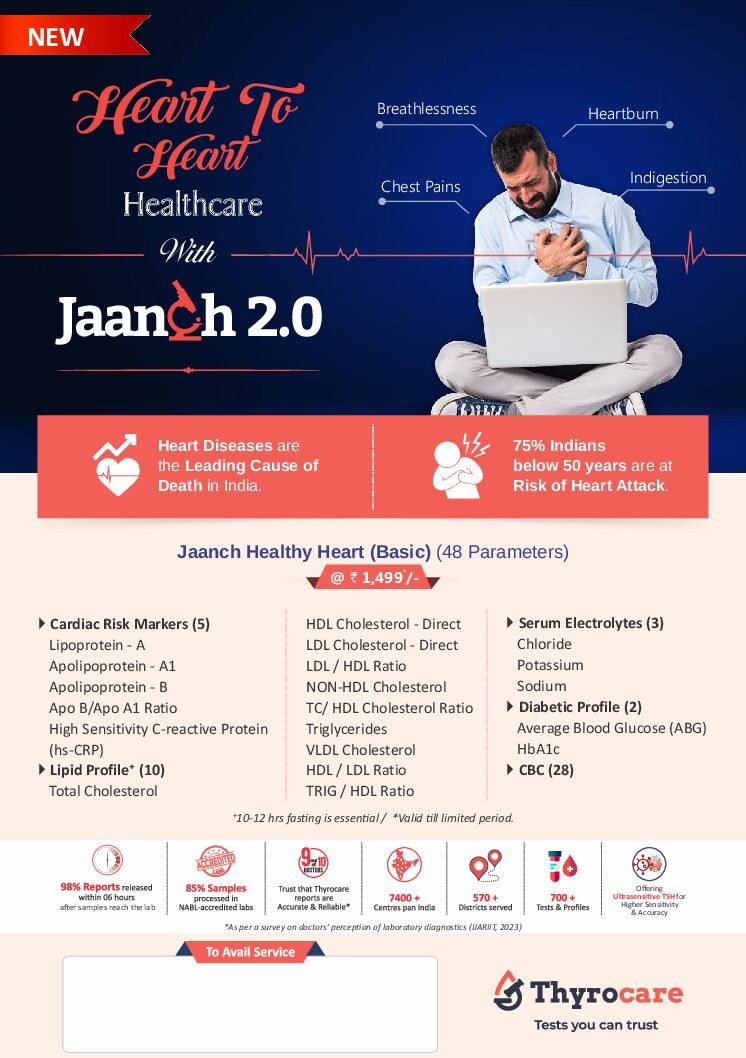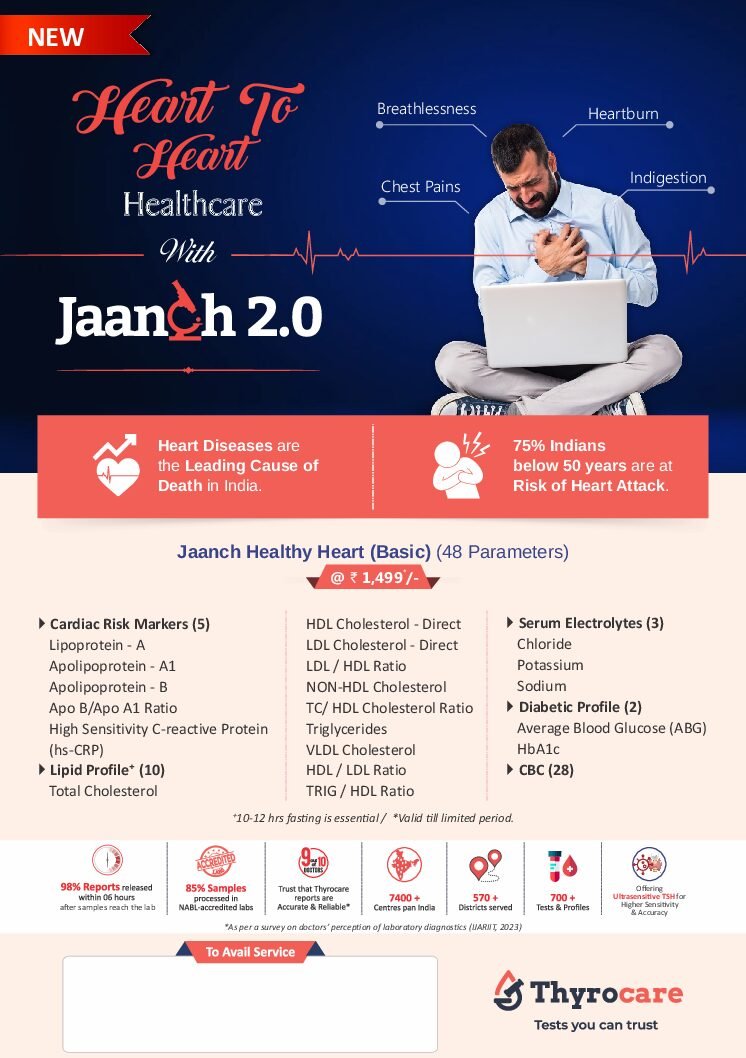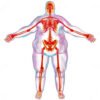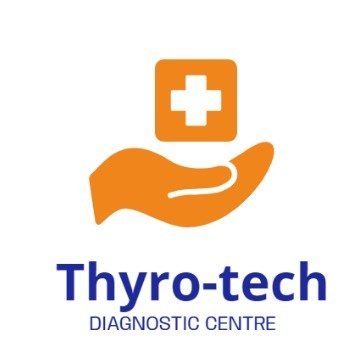A cardiac panel is a collection of blood and urine tests that evaluate the health of your heart. It can help your doctor determine your risk of heart disease and stroke.
Showing all 13 results
-
1%
CARDIAC PROFILE – BASIC
Heart failure (HF) has been recognized as a common complication of diabetes, with a prevalence of up to 22% in individuals with diabetes and increasing incidence rates. Detection of people at high risk for HF (stage A) or those with stage B HF (without symptoms but with either structural/ functional cardiac abnormalities or elevated biomarkers natriuretic peptides or troponin) would permit earlier implementation of effective strategies to prevent or delay the progression to advanced HF in individuals with diabetes
₹3,050.00Original price was: ₹3,050.00.₹3,000.00Current price is: ₹3,000.00. -
3%
CARDIAC RISK MARKERS – ADVANCED
Indians are at very high risk of developing Atherosclerotic Cardiovascular disease (ASCVD), they usually get the disease at an early age, have a more severe form of the disease and have poorer outcome as compared to the western populations. This is due to high prevalence of Atherogenic dyslipidemia, central abdominal adiposity & increased transfats in our diet. Among the various risk factors for ASCVD such as dyslipidemia, Diabetes mellitus, sedentary lifestyle, Hypertension, smoking, genetic predisposition etc., dyslipidemia has the highest population attributable risk for MI. Hence monitoring lipid profile regularly for effective management of dyslipidemia remains one of the most important healthcare targets for prevention of ASCVD. This monitoring should start as early as 20 years of age. Lipid association of India (LAI 2020) has categorized individuals into Low risk, Moderate risk, High risk, Very high risk & Extreme risk on the basis of their LDL-C, Non-HDL-C & ApoB blood levels. Use of lipid lowering drugs particularly statins has reduced ASCVD morbidity and mortality; however significant residual risk for the events remains. Additional testing for inflammatory (HsCRP), non-lipid (Homocysteine) and other lipid biomarkers (Apo A, Apo B & Lp(a) ) may be considered for risk refinement. Presence of one or more secondary risk factor should prompt the clinician to consider drug therapy for patient whose atherogenic cholesterol level is higher than goal level.
₹1,550.00Original price was: ₹1,550.00.₹1,500.00Current price is: ₹1,500.00. -
6%
₹3,200.00Original price was: ₹3,200.00.₹3,000.00Current price is: ₹3,000.00. -
9%
HEART FAILURE SCREEN
Heart failure (HF) has been recognized as a common complication of diabetes, with a prevalence of up to 22% in individuals with diabetes and increasing incidence rates. Detection of people at high risk for HF (stage A) or those with stage B HF (without symptoms but with either structural/ functional cardiac abnormalities or elevated biomarkers natriuretic peptides or troponin) would permit earlier implementation of effective strategies to prevent or delay the progression to advanced HF in individuals with diabetes.
Heart failure screening involves tests to assess heart function and identify potential problems, including blood tests, ECGs, echocardiograms, and potentially imaging tests like chest X-rays or stress tests.
Here’s a more detailed explanation of heart failure screening:
1. Initial Evaluation and Tests:
History and Physical Examination:
Your doctor will start by asking about your symptoms, medical history, and family history of heart problems. They will also listen to your heart, check your heart rate, and blood pressure.
Electrocardiogram (ECG or EKG):
This test records the electrical activity of your heart, helping to detect irregular heart rhythms and other abnormalities.Blood Tests:
These tests can help identify underlying causes of heart failure and assess overall health.Blood tests for specific proteins made by the heart and blood vessels, like natriuretic peptides, can help diagnose and monitor heart failure.
Ventriculography:₹5,500.00Original price was: ₹5,500.00.₹5,000.00Current price is: ₹5,000.00. -
50%
HIGH SENSITIVITY TROPONIN I
High-sensitivity troponin I (hs-cTnI) is a blood test used to detect and measure troponin levels, a protein released when heart muscle is damaged, aiding in the early diagnosis of heart-related conditions and guiding timely medical intervention.Here’s a more detailed explanation:What is High-Sensitivity Troponin I?-
-
A Sensitive Biomarker:High-sensitivity troponin I (hs-cTnI) assays are designed to detect even very small amounts of troponin in the blood, making them more sensitive than older troponin tests.
-
-
Heart Muscle Damage:Troponin is a protein found in heart muscle cells. When these cells are damaged, troponin is released into the bloodstream.
-
Early Diagnosis:The ability of hs-cTnI assays to detect low levels of troponin allows for earlier and more accurate diagnosis of heart conditions, including heart attacks (myocardial infarction).
-
Clinical Applications:
- Suspected Acute Coronary Syndrome: hs-cTnI is used to help diagnose and manage patients with suspected acute coronary syndrome (ACS), which includes heart attacks and unstable angina.
-
- Cardiovascular Risk Stratification: hs-cTnI can also be used to assess cardiovascular risk in individuals, even those without apparent symptoms.
-
- Monitoring Therapeutic Responses: hs-cTnI can be used to monitor the effectiveness of treatments for heart conditions.
-
-
How it Works:
- Serial Sampling: Measuring troponin levels at multiple time points (serial sampling) is crucial to detect the characteristic rise and fall of troponin levels associated with a heart attack.
-
- Distinguishing AMI from other conditions: Serial sampling helps differentiate a heart attack (AMI) from other conditions that can cause elevated troponin levels, such as renal failure, arrhythmias, or pulmonary embolism.
-
-
Advantages of High-Sensitivity Assays:
- Increased Sensitivity: hs-cTnI assays are significantly more sensitive than older assays, allowing for earlier and more accurate detection of heart damage.
-
- Earlier Rule-Out: They can help rule out non-ST-elevation myocardial infarction (NSTEMI) at an earlier time after the onset of chest pain.
-
- Facilitate Earlier Discharge: In some cases, they can help facilitate earlier discharge for patients with normal troponin levels.
-
Important Considerations:-
Not a Definitive Diagnosis:Elevated hs-cTnI levels alone do not always indicate a heart attack, and other conditions can also cause elevated levels.
-
Clinical Context:Troponin values must be interpreted in the context of the patient’s clinical presentation and other diagnostic tests.
-
Prompt Medical Evaluation:Elevated hs-cTnI levels require prompt medical evaluation and treatment to prevent complications and protect heart health.
₹1,000.00Original price was: ₹1,000.00.₹500.00Current price is: ₹500.00. -
-
16%
JAANCH HEALTHY HEART (ADVANCED)
To help diagnose or rule out heart failure, doctors often order blood tests to check for elevated levels of specific proteins like BNP or NT-proBNP, which are released by the heart in response to stress, and other tests to assess overall heart function and kidney function.Here’s a more detailed explanation:-
-
-
- Elevated levels of these proteins can indicate heart failure or other heart problems.
-
- BNP and NT-proBNP tests are often used to help diagnose heart failure, especially when someone is experiencing symptoms like shortness of breath or swelling in the legs.
-
-
-
Other Blood Tests:
- Complete Blood Count (CBC): This test measures the levels of different types of blood cells (red blood cells, white blood cells, and platelets), which can help assess overall health and identify conditions that could be contributing to heart failure, such as anemia.
-
- Electrolytes: These tests measure the levels of electrolytes (sodium, potassium, calcium, etc.) in the blood, which are important for heart function and kidney function.
-
- Kidney Function Tests: These tests assess how well the kidneys are working, as kidney problems can affect heart function and vice versa.
-
- Troponin Test: This test measures the levels of troponin, a protein released by the heart muscle when it is damaged, which is used to diagnose heart attacks.
-
- Blood Glucose (HbA1C) Test: This test measures average blood sugar levels over the past few months, which can help identify diabetes, a condition that can increase the risk of heart failure.
-
- Liver Function Tests: These tests assess how well the liver is functioning, as liver problems can affect heart function.
-
- Lipid Profile: This test measures cholesterol levels (total, LDL, HDL, and triglycerides), which can help assess the risk of heart disease.
-
-
Why Blood Tests are Important:
- Blood tests can help doctors determine if heart failure is the cause of a person’s symptoms.
-
- They can also help doctors assess the severity of heart failure and monitor the effectiveness of treatment.
-
- Blood tests can also help identify other conditions that may be contributing to heart failure.
-
₹2,999.00Original price was: ₹2,999.00.₹2,500.00Current price is: ₹2,500.00. -
-
6%
JAANCH HEALTHY HEART (BASIC)
Indians are at very high risk of developing Atherosclerotic Cardiovascular disease (ASCVD) and usually get the disease at an early age, have a more severe form of the disease and have poorer outcome as compared to the western populations.This is due to high prevalence of Atherogenic dyslipidemia, central abdominal adiposity & increased transfats in our diet. Among the various risk factors for ASCVD such as dyslipidemia, Diabetes mellitus, sedentary lifestyle, Hypertension, smoking, genetic predisposition etc., dyslipidemia has the highest population attributable risk for MI. Hence monitoring lipid profile regularly for effective management of dyslipidemia remains one of the most important healthcare targets for prevention of ASCVD. This monitoring should start as early as 20 years of age. This test panel helps clinician to decide if therapy is required and what should be the treatment goal for you
₹1,499.00Original price was: ₹1,499.00.₹1,400.00Current price is: ₹1,400.00. -
16%
JAANCH HEALTHY HEART (BASIC)
Indians are at very high risk of developing Atherosclerotic Cardiovascular disease (ASCVD) and usually get the disease at an early age, have a more severe form of the disease and have poorer outcome as compared to the western populations.This is due to high prevalence of Atherogenic dyslipidemia, central abdominal adiposity & increased transfats in our diet. Among the various risk factors for ASCVD such as dyslipidemia, Diabetes mellitus, sedentary lifestyle, Hypertension, smoking, genetic predisposition etc., dyslipidemia has the highest population attributable risk for MI. Hence monitoring lipid profile regularly for effective management of dyslipidemia remains one of the most important healthcare targets for prevention of ASCVD. This monitoring should start as early as 20 years of age. This test panel helps clinician to decide if therapy is required and what should be the treatment goal for you.
₹1,800.00Original price was: ₹1,800.00.₹1,499.00Current price is: ₹1,499.00. -
14%
JAANCH HEART SCREEN EXTENDED
Jaanch Heart Screen Extended package includes 73 tests, providing a detailed evaluation of your cardiovascular health. From cholesterol levels and cardiac risk markers to diabetes and kidney health parameters, this screening helps detect early warning signs and assess potential risk factors. Ideal for individuals with a family history of heart disease, existing conditions like hypertension or diabetes
An extended heart screen blood test, also known as a cardiac profile, is a comprehensive panel of tests that evaluates various aspects of heart health, including cholesterol levels, inflammation markers, and other indicators of heart disease risk.Here’s a breakdown of what an extended heart screen blood test typically includes:1. Cholesterol and Lipid Profile:- Total Cholesterol: Measures the overall amount of cholesterol in your blood.
- LDL (Low-Density Lipoprotein) Cholesterol: Often referred to as “bad” cholesterol, high levels can lead to plaque buildup in arteries.
- HDL (High-Density Lipoprotein) Cholesterol: Known as “good” cholesterol, helps remove LDL from the arteries.
- Triglycerides: Another type of fat in the blood, high levels can increase heart disease risk.
- Non-HDL Cholesterol: Calculated by subtracting HDL cholesterol from total cholesterol, it’s another indicator of plaque buildup.
2. Inflammation Markers:-
C-Reactive Protein (CRP):Elevated levels can indicate inflammation in the body, which is linked to heart disease.
-
Homacystine :A protein involved in blood clotting, elevated levels can increase the risk of blood clots.
3. Other Important Markers:- Troponin: A protein released into the bloodstream when heart muscle is damaged, used to diagnose or rule out a heart attack.
- NT-proBNP: A protein produced by the heart, elevated levels can indicate heart failure.
- Lipoprotein (a): An additional lipoprotein that is present in some people and increased heart risk.
- Apolipoprotein B (ApoB): A protein that is included in bad cholesterol.
- Full Blood Count (FBC): Measures different types of blood cells, which can indicate infections or anemia.
- Urea and Electrolytes (Us and Es): Helps monitor kidney function and electrolyte balance, which can affect heart rhythm.
- Glucose: Measures blood sugar levels, which can be linked to heart disease.
- Liver and thyroid function: These tests measure liver function and the thyroid function.
₹3,500.00Original price was: ₹3,500.00.₹2,999.00Current price is: ₹2,999.00. -
9%
LIPID PROFILE COMPLETE
A complete lipid profile, also known as a lipid panel or cholesterol test, is a blood test that measures the levels of different types of lipids (fats) in your blood, including total cholesterol, LDL (bad) cholesterol, HDL (good) cholesterol, triglycerides, and VLDL cholesterol.Here’s a breakdown of what a lipid profile measures and why it’s important:-
-
Purpose:To assess your risk of heart disease and stroke by measuring the levels of different types of fats in your blood.
-
-
Components:
- Total Cholesterol: The overall amount of cholesterol in your blood.
-
- LDL Cholesterol: “Bad” cholesterol that can build up in arteries, increasing heart disease risk.
-
- HDL Cholesterol: “Good” cholesterol that helps remove LDL from the blood.
-
- Triglycerides: A type of fat that the body uses for energy.
-
- VLDL Cholesterol: A type of lipoprotein that transports triglycerides.
-
-
Procedure:
- Fasting: You’ll usually need to fast for 9-12 hours before the test, consuming only water.
-
- Blood Draw: A blood sample is taken from a vein, usually in your arm.
-
-
Why it’s important:
- High levels of LDL cholesterol and triglycerides can increase your risk of heart disease and stroke.
-
- Low levels of HDL cholesterol can also increase your risk.
-
- A lipid profile can help your doctor assess your risk and recommend appropriate interventions.
-
₹2,200.00Original price was: ₹2,200.00.₹2,000.00Current price is: ₹2,000.00. -
-
12%
LIPID PROFILE EXTENDED
A lipid profile is a blood test that measures the levels of cholesterol and triglycerides in your blood. It’s also known as a cholesterol test.Why get a lipid profile- To assess your risk of heart disease, stroke, and cardiovascular disease
- To detect coronary artery disease
- To help determine if you have high cholesterol
What’s measured- Total cholesterol: The total amount of cholesterol in your blood
- High-density lipoprotein (HDL) cholesterol: Often called “good cholesterol” because it helps remove LDL from your blood
- Low-density lipoprotein (LDL) cholesterol: Often called “bad cholesterol” because it can build up in your blood vessels
- Triglycerides: A type of fat in the body that comes from food and extra calories
Who should get a lipid profile- People with a family history of heart disease or stroke
- People who are at risk for heart disease
- People who are being treated for heart disease
- People above 45 years of age
- People above 65 years of age
How is the test performedA blood sample is drawn from a vein, usually located on the inside of the elbow or the back of the hand.₹1,600.00Original price was: ₹1,600.00.₹1,400.00Current price is: ₹1,400.00. -
6%
NT-PROBNP(NT-PRO BNP (N-TERMINAL PRO B TYPE NATRIURETIC PEPTIDE))
N-terminal precursor of brain natriuretic peptide (NT-proBNP) are released from myocardial cells in response to volume expansion and increased wall tension. They are well established rule-out tools for cardiac disease in unselected communities. NT-proBNP value <125 pg/mL excludes cardiac dysfunction with a high level of certainty in patients presenting with dyspnea. As the value increases heart failure becomes more likely. NT-proBNP levels are correlated with New York Heart Association (NYHA) functional classes for CHF. However, the role of natriuretic peptides extends beyond heart failure diagnosis; it is a clinical support tool in risk stratification & management in both inpatient and outpatient settings. Recent studies have shown that it can also be used for Cardiovascular risk assessment in asymptomatic patients with Type 2 Diabetes Mellitus.
₹3,199.00Original price was: ₹3,199.00.₹3,000.00Current price is: ₹3,000.00. -
18%
OBESITY PANEL
Leptin is an adipocyte derived hormone that is essential for normal body weight regulation. Leptin production is under neuroendocrine control and the serum concentrations vary directly with the amount of triglycerides stored in adipose tissue depots.
₹5,500.00Original price was: ₹5,500.00.₹4,500.00Current price is: ₹4,500.00.










